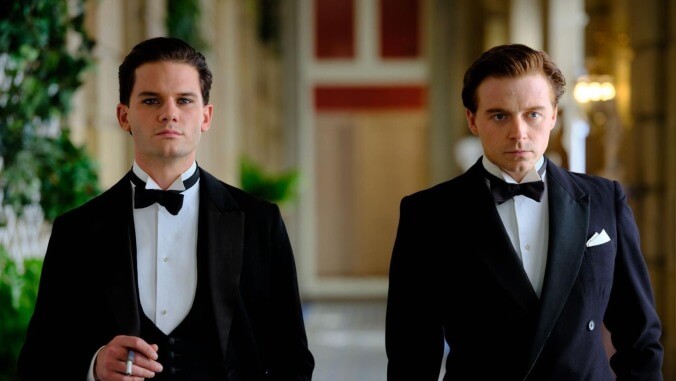The rewarding Benediction finds the poetry amid the pain
Terence Davies offers another brilliantly written, decidedly unhappy potrait
Film Reviews Benediction
With Benediction, British auteur Terence Davies makes a spiritual return to his first two narrative films, the highly autobiographical, montage-rich Distant Voices, Still Lives, and The Long Day Closes. Strangely, his latest is a biopic about someone else—someone who made his most lasting mark 25 years before Davies was even born, the poet Siegfried Sassoon.
The two men did not have similar upbringings. Sassoon was an aristocrat, even if he was cut off from the centuries-old Sassoon family fortune because his father married outside the Jewish faith. (Luckily for him there was money coming in from mom’s side.) Davies grew up the son of a violent drunkard in a working class Catholic family with nine older siblings. And yet they share an artistic sensitivity, a bone-deep nostalgia that dips into hot rage directed at time’s incessant march forward. Though Davies’ last film, A Quiet Passion, was also a poet’s biopic (with Cynthia Nixon as Emily Dickinson), Benediction feels, in a weird way, like a completion of that original trilogy.
The movie may seem, at first, to be a typical BBC production: rich Brits in fancy rooms. The first scene shows young Siegfried (Jack Lowden) and his brother Hamo (Thom Ashley) attending a performance of Igor Stravinsky’s modernist, angry Rite of Spring. Instead of the ballet, we cut to a collage of black and white WWI footage, then stylistically lit images of the boys going off to war. Only Siegfried returns, but, perhaps as an homage to the British stiff upper lip, there’s little eulogizing of his lost brother. Instead, Siegfried turns to letters and pens an indictment of the war and what he feels are Britain’s unstated, imperialist intentions.
Rich family friends are able to downgrade the official response from a court martial to a trip to a Scottish sanitarium (not too shabby!), where Siegfried engages in talk therapy and admits a proclivity for “the love that dare not speak its name.” He has his first affair with another poet in residence (Wilfred Owen, played by Matthew Tennyson), who is eventually deemed healthy enough to serve and, naturally, is killed at the front.
The torment of war is represented by intermittent collages, some of it “projected” in rooms (and to anachronistic music), and occasional flashes of half-remembered screams or gunshots. What gets more attention are the recitations of Sassoon’s words which, after the war, brought him enough celebrity that he entered London’s most sophisticated corners of society.
Here the movie takes a sharp left turn, as Sassoon’s life might seem, from the outside, to be a bowl of cherries. He’s soon on the arm of famed songwriter-performer Ivor Novello, played by the preposterously handsome Jeremy Irvine, all pouty lips and dark eyelashes. (We meet him as he serenades a salon with the annoying ditty “And Her Mother Came Too,” a cri de coeur about a horny boy who can’t get what he wants.) But Sassoon’s relationship with him (and others, including Calam Lynch as Stephen Tennant) is undercut with cruelty. Another lover (Tom Blyth as Glen Byam Shaw) looks upon the sharp tongues and wounded egos as collateral damage from “the shadow life we lead.”
The upper crust dissbombs (of which there are a great many) are certainly clever—Davies can really write—but beneath the chuckles is a wellspring of pain. In a society where homosexuality isn’t just unaccepted but is illegal, breakups and backstabbing seem to be expected. (Not that dating in 2022 is all roses, but the implication here is that the wider culture would shame you for any heartbreak.)
Quietly, Benediction reasons that Sassoon is self-sabotaging as a way to sublimate his wartime trauma. The last shot of the film—a single take in which Lowden’s face melts from emotional overload while his wartime poem is read in voice over—is one of the more devastating pieces of cinematic punctuation in recent memory.
But little else is so explicit. This is a movie where an awful lot is unsaid. There’s no mention of Sassoon’s Jewish heritage (or of his notable family—yes, Vidal Sassoon is on the same tree) and references to the zeitgeist fly by. If you don’t know who Bosie is, well, that’s on you.
At some point along the way, Sassoon marries. At first it seems like it might be a nice arrangement, but it quickly sours. Through cuts back and forth in time, Sassoon is played as an older, angrier man by Peter Capaldi, who converts to Catholicism, yearning for stability, but remains a terrifying figure, disinterested in healing old bonds, and screaming about how pop music of the early 1960s is vulgar. The film is bookended with another trip to the theater. It isn’t the fiery Rite Of Spring, but the corny, lightweight musical Stop The World—I Want To Get Off. Sassoon decides to take a long walk home in the cold afterwards, fixated on a culture that doesn’t seem to know what to do with itself.
There’s nothing about this film that is uplifting, but Davies’ handling of the material is so exquisite that the overbearing melancholy becomes, in the end, a work of poetry.
4 Comments
“decidedly unhappy potrait“ ->”decidedly unhappy portrait”
“Older angrier man.”Played by Peter Capaldi.*suddenly terrified*
Keep out of range; his invective can literally burn your face off.
“The last shot of the film—a single take in which Lowden’s face melts from emotional overload while his wartime poem is read in voice over , , ,”That last poem is not by Sassoon but by Wilfred Owen. It is “Disabled,” the poem Owen showed him in the sanitarium. Therefore, the grief Sassoon was expressing was at the same time general (for all the victims of the war) and personal (for Owen)–a masterstroke.